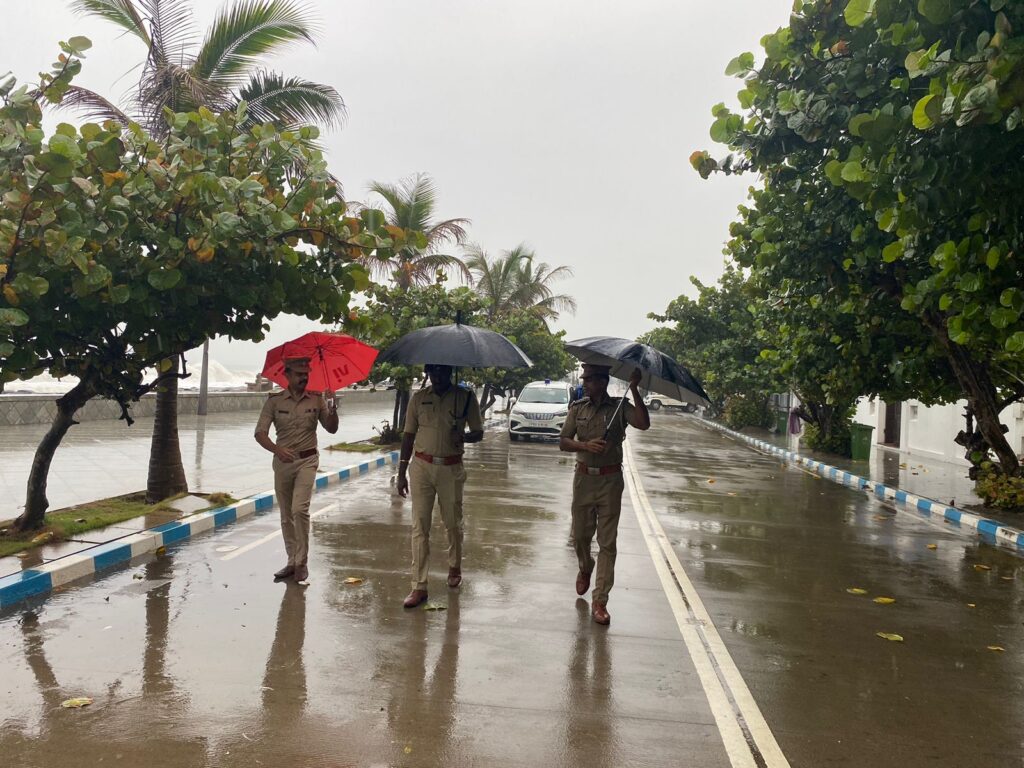Cyclone Fengal: Puducherry Urges Residents to Stay Indoors; Heavy Rainfall Hits Tamil Nadu
4 min read
The southeastern coast of India is bracing for Cyclone Fengal, a severe weather event bringing heavy rainfall and strong winds. Puducherry and Tamil Nadu are on high alert as the storm approaches, with both states taking extensive measures to ensure the safety of residents.
The India Meteorological Department (IMD) has issued a red alert, predicting Cyclone Fengal to make landfall between Karaikal and Mahabalipuram, near Puducherry. With strong winds reaching speeds of up to 90 km/h and continuous rainfall, the authorities have moved quickly to minimize potential damage.
Puducherry Issues Precautionary Measures
The Puducherry government has strongly advised its residents to stay indoors and avoid venturing out unless absolutely necessary. Public safety announcements have been disseminated via text messages and local media, emphasizing the importance of staying informed and prepared.
Educational institutions across Puducherry have been closed until further notice to safeguard children and staff. Meanwhile, emergency helplines have been set up to assist citizens in distress. Key helpline numbers include:
- Control Room (Toll-Free): 112 and 1077
- WhatsApp Helpline: 94889 81070
Citizens are encouraged to contact these numbers for assistance related to flooding, fallen trees, or any other emergencies caused by the cyclone.
Evacuation and Relief Efforts
Residents of low-lying areas and other vulnerable locations in Puducherry have been evacuated to temporary shelters. These shelters are stocked with essential supplies, including food packets, drinking water, and blankets.
The National Disaster Response Force (NDRF) has deployed multiple teams to Puducherry and Tamil Nadu to handle rescue operations. Local authorities are also coordinating with these teams to ensure swift responses to emergencies like waterlogging, fallen electric poles, and damaged infrastructure.
Tamil Nadu Gears Up for Cyclone Impact
In Tamil Nadu, heavy rainfall and gusty winds have already caused disruptions in coastal districts. The IMD has identified Chennai, Villupuram, Kanchipuram, and Mayiladuthurai as high-risk areas. Tidal waves and waterlogging have been reported in parts of these districts, creating challenges for commuters and local residents.
The Tamil Nadu government has taken several proactive steps to mitigate risks:
- Closure of Schools and Colleges: All educational institutions in affected districts have been shut down. Officials have been given the authority to extend these closures depending on local conditions.
- Work-from-Home Advisory: IT companies and other corporate offices have been advised to allow employees to work from home to reduce travel risks during the cyclone.
- Suspension of Transport Services: Public transport along the East Coast Road (ECR) and Old Mahabalipuram Road (OMR) has been temporarily halted to avoid accidents.
- Public Safety Guidelines: Residents have been advised to avoid visiting beaches, tourist spots, or any outdoor activities during this period.
Cyclone Fengal: Meteorological Details
As of early Thursday morning, Cyclone Fengal was located over the Southwest Bay of Bengal. It was approximately 180 km east of Puducherry and 190 km southeast of Chennai. The cyclone is moving west-northwestward and is expected to cross the Tamil Nadu-Puducherry coastline by Thursday afternoon.
The IMD has predicted:
- Wind Speeds: 70-80 km/h, with gusts up to 90 km/h.
- Rainfall: Heavy to very heavy rainfall in Tamil Nadu and Puducherry, with isolated areas experiencing extremely heavy rainfall.
- Sea Conditions: Rough to very rough, with high tides affecting coastal regions.
Emergency Preparations
To ensure the safety of residents, both state governments have issued a series of emergency guidelines:
- Stay indoors and avoid unnecessary travel.
- Keep essential items like food, water, flashlights, and medical supplies ready.
- Charge mobile phones and ensure they are accessible for emergency calls.
- Avoid coastal areas, riversides, and other flood-prone zones.
- Follow updates from official sources like the IMD and state disaster management authorities.
Public Response and Cooperation
Residents of Puducherry and Tamil Nadu have been responding positively to the advisories, showing resilience and preparedness. Many families have stocked up on essentials, while fishermen have been advised not to venture into the sea until further notice.
While the government and disaster management teams are working tirelessly to minimize the impact of Cyclone Fengal, public cooperation is crucial. Authorities have stressed the importance of adhering to safety instructions and avoiding panic during this challenging time.
Long-Term Preparedness for Cyclones
India’s southeastern coast is prone to cyclones due to its proximity to the Bay of Bengal. With the increasing frequency of such natural disasters, it is essential for local governments and residents to prioritize long-term preparedness:
- Strengthening Infrastructure: Building cyclone-resistant homes and flood-proof infrastructure can significantly reduce damage.
- Improved Early Warning Systems: Timely alerts and precise weather predictions can save lives and reduce economic losses.
- Community Awareness Programs: Educating citizens about disaster preparedness can help them respond effectively during emergencies.
Conclusion
Cyclone Fengal serves as a reminder of nature’s unpredictable power and the importance of readiness. As Puducherry and Tamil Nadu brace for impact, coordinated efforts by the government, emergency teams, and the public will play a crucial role in minimizing the cyclone’s effects.
Stay tuned to official weather updates and follow all safety protocols to ensure your well-being. Let us all come together to face this challenge with strength and resilience.




